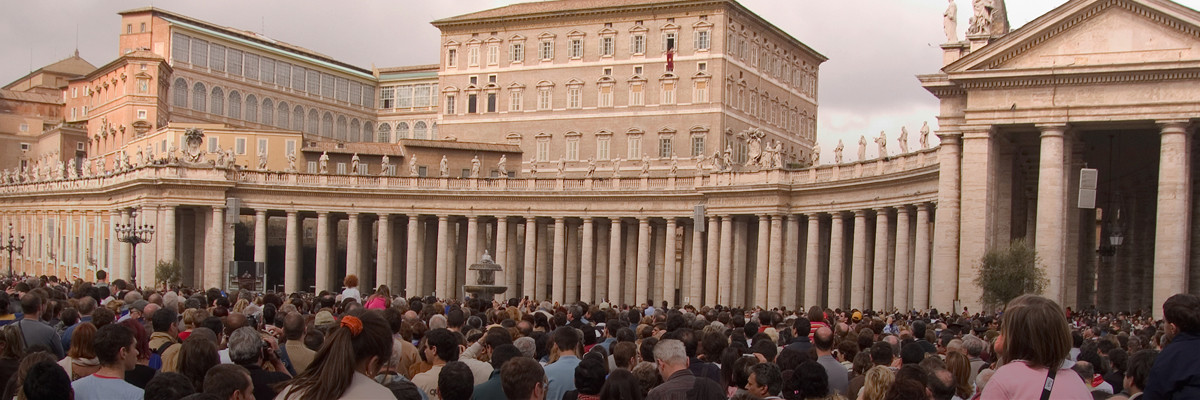
Authors
-
Edward Cameron
Former Managing Director, BSR
We have become accustomed to the notion that science and faith are forever destined to clash, but over the next two weeks, the case for ambitious climate action—a case often rooted in science—will be advanced by a number of unusual champions: world religious leaders.
Just this morning, speaking to a crowd of 15,000 on the White House lawn, Pope Francis told U.S. President Obama that the he thought the president’s recent climate actions are encouraging during this “crucial moment in history.” It was surprising to hear the pope explicitly reference the Obama administration’s new proposed emissions regulations, and tomorrow, he will talk policy again—this time in an address before a joint session of Congress, where he will argue passionately for greenhouse gas emissions reductions to protect both social and ecological systems.
This follows the May publication of Pope Francis’ encyclical, “Our Common Home,” and complements a recent declaration on climate change by Islamic leaders and a rabbinic letter on the climate crisis signed by more than 400 American rabbis. Each of these public statements centers on the moral imperative to act and calls for an integrated approach to climate action that covers both environmental and social justice.
The volume of scientific evidence in support of climate action has grown to the point that within the scientific community, global warming denial has virtually no influence. Similarly, the economic case for climate action has been argued with substantial research conducted by players as diverse as Mercer, the British Treasury, and the Global Commission on the Economy and Climate.
In “Our Common Home,” Pope Francis states that “living our vocation to be protectors of God's handiwork is essential to a life of virtue.” The rabbinic letter encourages all Jews to explore “responsibilities toward the Earth and all humankind.” It further asks for “a new sense of eco-social justice that includes the healing of our planet.” Meanwhile, the Islamic leaders call on all Muslims: “Do not strut arrogantly on the earth.” In each case, these religious leaders draw upon their own sacred texts to show that protection of the environment is not a secondary aspect but core to their respective faiths.
For business leaders, these calls may fall on deaf or at least indifferent ears. After all, they are coming from the spiritual world of religion, not the secular world of business. But these religious convocations extend the vocabulary of arguments for climate action to include a moral and ethical dimension.
For many business leaders, embracing the moral imperative represents a new opportunity for leadership that extends beyond leadership based on the economic or scientific case for climate action. Unilever CEO Paul Polman has described climate action as “a moral obligation to not just take care of ourselves but also to work for the common good and our fellow citizens.” Apple CEO Tim Cook has developed his leadership brand at Apple by stressing the company’s moral standing as well as its innovation. David Crane, who leads energy company NRG, has written “we all make decisions every day that reflect our core values” and advises other business leaders to heed the pope’s call on climate.
And as we have seen recently on issues like gun control, gay and lesbian marriage, and even the sale of the Confederate flag, smart business leaders have joined the cultural conversation. On these topics, the business case for action may be narrow, but the desire for business to take a leadership position and align with common values is great. When it comes to climate change, there is a strong business case to be made for action, and now there is a strong moral case as well.
Each of the religious leaders’ declarations advocates for a holistic approach to tackling complex, global challenges. In “Our Common Home,” the pope explains that social and environmental issues must be addressed holistically “so as to hear both the cry of the Earth and the cry of the poor.” He argues that “strategies for a solution demand combating poverty, restoring dignity to the excluded, and, at the same time, protecting nature.” According to the rabbinic letter, Jewish tradition teaches that social justice, sustainable abundance, a healthy Earth, and spiritual fulfillment are inseparable.
The common theme in the moral case for climate action is that those who will be hit first and hardest by climate impacts have contributed least to the problem. Many business leaders have noted that they are acting on climate for the sake of their grandchildren, who will inherit the Earth. These invocations come in the same spirit as the religious leaders’ calls to action—and these may be the most powerful arguments for climate action to date.
Often perceived as an environmental or technical issue that must be communicated with charts and graphs on the basis of science, climate change has yet to touch hearts and mobilize concerned citizens. With close to half the global population professing a belief in these Abrahamic religions, this may be about to change. The rabbinic letter declares, “We know all Earth needs not only the joyful human voice, but also the healing human hand.”
The issue of climate change has many dimensions, and the moral aspect is becoming paramount in the cultural conversation. It’s time for more business leaders to take note and join, hand in hand, voice with voice, in this unusual alliance of climate champions.
Let’s talk about how BSR can help you to transform your business and achieve your sustainability goals.